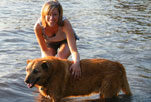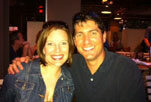Running is my greatest passion, but at age 27 it nearly cost me my life. Last March, I ran a half-marathon and went straight into training for a full marathon. I noticed a pain in my hip after I completed the half-marathon, but like most runners, I ran through the pain. As it turned out, I had a stress fracture in my hip that required surgery.
All things considered, my out-patient surgery went well and I was even able to get up and walk around a bit. I seemed to be well on my way to recovery when everything changed. I wore compression hose for the first 3 days after surgery, but did not get any blood thinners. I was taking hormonal birth control pills, and even though I was aware they carried risk for blood clots, I saw myself as at very low risk. I had previous surgery without any problems, so I saw myself as a model of good health, and at low risk. Moreover, there is no history of blood clots in my immediate family.
A week after my surgery, I felt a strange flutter in my heart and sudden shortness of breath when I got up during the night. I’ve had asthma all my life, so shortness of breath was not foreign to me. I figured I just needed a minute to catch my breath, but it persisted. I called my Mom into my room and told her I thought I was having an asthma attack, even though a little voice in the back of my head told me it was something worse than my typical asthma attack. I ignored that warning voice, and told myself, “I’m 27, I’m healthy, and it is just an asthma attack.”
Thankfully, my mother had the sense to call 911, despite my pleas not to. Calling an ambulance for an asthma attack seemed a bit ridiculous to me. When the EMTs (emergency medical technicians) arrived, I was given oxygen and a nebulizer treatment, which did not make any difference. I knew that another real possibility was a pulmonary embolism (PE) from an episode of Grey’s Anatomy, so TV actually taught me something. I wasn’t wheezing, so that was another clue that it was not an asthma attack.
I was rushed to the ER and a CT scan showed I had multiple bilateral PEs. My years with asthma accustomed me somewhat to the threat of being unable to catch my breath, although it is always very scary.
Everything after my diagnosis is a bit of a blur. They airlifted me to a larger hospital, where they found a clot in my calf. They admitted me into ICU and I spent the next week in the hospital. Thankfully, I responded quickly to treatment and was released from ICU after one day, and was transferred to the cardiac floor. Ironically, the reason I responded so quickly was because I was in great shape from running, even though my running was what caused the initial injury that necessitated hospitalization. My week in the hospital was incredibly hard on me. Doctors and nurses were constantly poking me with needles and checking my blood pressure, temperature, pulse, and respiratory rates. All I could think about was how much my life had changed in a month. I went from being a healthy runner to a hospitalized patient.
What no one talked to me about at all is how hard it is to go home from the hospital. I experienced a range of emotions once I got home. I was angry, scared, depressed, and even confused. It’s been 8 months and I still have my ups and downs, although I’m extremely grateful I survived. I still have my bad days. As much as I hate to admit it, I’m scared a lot of the time. I’m scared I’m going to clot again, or that I won’t be so lucky if I have another clot. I’m scared that I’ll end up on blood thinners for the rest of my life. As scared as I am, I’m a strong person and I’m not going to let this change me. I’m going to keep running and racing and getting back to doing what I love. I hiked to the top of a 14,300 foot mountain four months after discharge from the hospital, and it felt amazing.
Needless to say, I’ve stopped taking birth control pills, and I am awaiting test results to see whether I have any clotting disorders. I was blindsided by feelings of invincibiIity that is common amongst people my age, and the belief that blood clots only happen to older people. I hope that by sharing my story, I can help others going through the same thing. It is scary and the recovery is tough, but I’ve already done the hardest thing – I’ve survived.
I think it is important to share my experience to dispel some of these assumptions. Blood clots happen to people who are older or out so shape, but also in some instances, to the young and active.
Take Home Messages
- Orthopedic surgery is considered high risk for clots, so preventive measures (anticoagulation and compression stockings or devices) are beneficial
- Hormonal birth control and immobility add to risk for blood clots
- Call an ambulance right away to get to the ER whenever you have symptoms of unusual shortness of breath
- Emotional ups and downs are a common part of a major health scare
- Blood clots occur in young and active people when there are a collection of risk factors (orthopedic surgery, immobilization, birth control pills, no prophylaxis with blood thinners, and only 3 days with compression hose)




